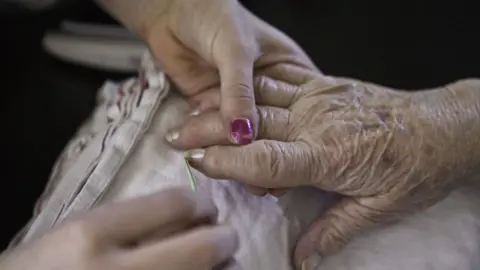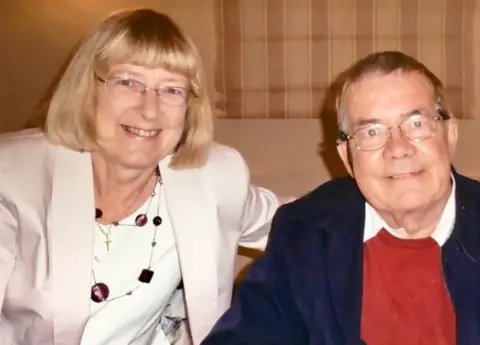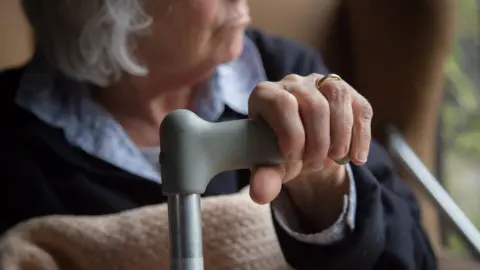Thousands died waiting for NHS funding decision
 Getty Images
Getty ImagesMore than three thousand people died in England last year awaiting an NHS decision on their eligibility for home care funding.
A charity said it was "tragic and ludicrous" that families learned the outcome after losing their relatives.
One widow told the BBC a nurse came to assess her husband the day after he died.
NHS England said improvements had been made but the process could be "more efficient".
Continuing healthcare (CHC) is a funding package given to people with severe health and social care needs, such as Alzheimer's or Parkinson's, but who are not in hospital.
Applications should take no longer than 28 days to deal with, but clinical commissioning groups (CCGs) revealed 3,400 people died in 2017-18 while awaiting a decision on their application.
The BBC obtained information from 185 out of 198 CCGs about the outcome of CHC applications received in the last financial year.
Figures from NHS England show that last year, nearly 150,000 CHC assessments were carried out. A third of assessments resulted in the applicant being told they were not eligible for funding.
'I relived my husband's suffering'
 Sue Ellis
Sue Ellis Sue Ellis from Gloucestershire cared for her husband Bob, who had Parkinson's disease, before he died in November 2014.
An assessment of his case was carried out the day after he died.
"It was ludicrous really," Mrs Ellis said. "The nurse sat down and said 'where is your husband?'"
"In Bob's final months I had to do everything for him and I was left exhausted. His case was retrospectively assessed, which was horrendous, having to relive my husband's suffering. And then at the end of it all (Wiltshire) CGC rejected the application.
"Quite frankly if I'd known what the outcome would been I wouldn't have bothered with the whole process".
A spokeswoman said Wiltshire CCG could not comment on individual cases.
Most adults in England have to pay some of all of the costs of any care they receive.
Many applicants are often seeking end of life care.
Being awarded CHC funding means the NHS pays for things such as care at home or in a nursing home.
A report by the National Audit Office in 2017 found that providing CHC cost the NHS more than £3bn a year.
 Getty Images
Getty ImagesMatina Loizou from the charity Parkinson's UK said: "The fact that families are notified about the outcome of their application after their loved one has died is as tragic as it is ludicrous.
"We know from calls to our helpline that the application process can be a very isolating and hopeless experience, and the impact on families can be immense. Quite often, assets like houses have to be sold, or spouses or relatives have to quit their jobs to be full-time carers."
Recent improvements
More people are expected to apply for funding in future as a result of an ageing population.
In January the House of Commons Public Accounts Committee warned that plans to make £855m of efficiency savings in continuing and NHS-funded nursing care by 2020-21, could result in fewer people being awarded funding in the future.
A spokeswoman for NHS England said: "Spending on continuing healthcare is going up as more people are being supported but it's local GP led groups that undertake eligibility assessments, using the National Framework for Continuing Healthcare.
"While there have been recent improvements in practice, there is potential to make the process more efficient and effective for patients, as the majority of people put through an assessment turn out not to need it."
